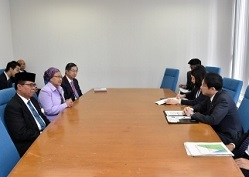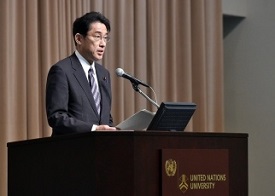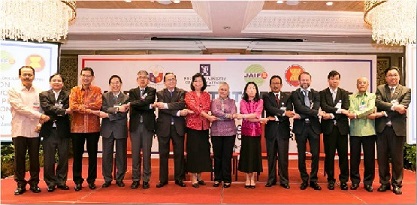|
Japan's cooperative efforts towards ASEAN in the field of peacebuilding
February 2016
1. Overview
ASEAN is drawing attention as the world’s “open growth center” as its GDP expanded threefold over the past decade. ASEAN’s remarkable economic growth has been underpinned by the peace and stability of the region. In the past, each ASEAN state dealt with their own regional conflicts, such as in East Timor, Mindanao (Philippines), Aceh (Indonesia) and Myanmar. However, the progress made in ASEAN cooperation in recent years has been accompanied by accelerated efforts to share good practices of and lessons learnt from peacebuilding processes across the ASEAN region.
In May 2011, ASEAN leaders agreed to establish the “ASEAN Institute for Peace and Reconciliation (AIPR)” that is designed for undertaking relevant researches and studies on the promotion of peace and reconciliation. To “strengthen research activities on peace, management and conflict resolution” is also outlined as one of ASEAN’s key objectives in the joint declaration entitled “ASEAN 2025: Forging Ahead Together,” which was adopted at the ASEAN Summit Meeting in November 2015. The utilization of the AIPR is listed as one of the concrete measures to be undertaken to fulfil this objective.
2. Japan’s Cooperation in the Field of Peacebuilding
(1) Individual case studies
Japan has been supporting peacebuilding efforts in various parts of Asia as a peace-loving nation since the end of the war. At present, we are working on the following issues in the Southeast Asian region.
(A) Peace in Mindanao
With regard to the peace negotiations between the Government of the Philippines and the Moro Islamic Liberation Front (MILF), the “The Framework Agreement concerning the Mindanao Peace Process,” which paved the way towards a final peace, was signed in October 2012; and the “Comprehensive Agreement on the Bangsamoro concerning the Mindanao peace process” was subsequently signed in March 2014. At present, the necessary legislations are being developed in preparation for the establishment of an autonomous government in 2016. Based on the recognition that peace in Mindanao will serve regional peace and stability, The Government of Japan is contributing to the reconstruction and development of the Mindanao region through: (i) the dispatch of development experts to the Social and Economic Development Section of the International Monitoring Team (IMT); (ii) the concentrated implementation of economic cooperation projects such as extending Grassroots Grant Assistance for Human Security in former conflict-affected areas (J-BIRD); and (iii) the participation in the International Contact Group (ICG) that is providing advice by attending the peace talks as an observer, among others. In August 2011, President Benigno Aquino III and MILF Chairman Al Haj Murad Ibrahim visited Japan, and had informal discussions on the outskirts of Tokyo, under the intermediation of the Government of Japan, aiming for resolving the various issues on Mindanao peace process. The Government of Japan is currently providing support toward the economic autonomy in the Bangsamoro Area, in anticipation of the establishment of an autonomous government. In November 2015, the Government of Japan decided to support on a yen loan programme of approximately 15 billion yen to provide, for example, capital investment and operating funds for private firms and agricultural cooperatives in the region.

Foreign Minister Kishida receives visiting stakeholders of the Mindanao peace process (June 2015)
(B) National reconciliation between the Government of Myanmar and ethnic minority groups
In February 2013, the Government of Japan appointed Mr. Yohei Sasakawa, Chairman of the Nippon Foundation, as Special Envoy of the Government of Japan for National Reconciliation in Myanmar. Mr. Sasakawa had been providing assistance to ethnic minorities in Myanmar over many years. Under the cooperation with Mr. Sasakawa, the Government of Japan has continued to support toward national reconciliation between the Government of Myanmar and its ethnic minority groups in various forms. In January 2014, the Government of Japan announced that it would provide up to 10 billion yen to Myanmar for the next five years, in order to improve livelihoods in ethnic minority regions. Since August 2011, the Government of Myanmar has conducted peace negotiations with 16 of the major ethnic minority armed groups in order to achieve national reconsiliation. In March 2015, the parties agreed on a basic draft agreement for a nationwide ceasefire. In October of the same year, they held a signing ceremony for the ceasefire agreement; eight of the ethnic minority armed groups signed the agreement. The Special Envoy of the Government of Japan, Mr. Sasakawa, also attended the ceremony to sign the agreement as a witness. In order to implement the agreement, political dialogue is scheduled in the coming future to discuss such as developing a code of conduct for monitoring the ceasefire and subsequently monitoring the ceasefire.
(C) Peace in Cambodia
Japan became actively involved in the peace process of Cambodia starting from the end of the 1980s. In 1989, Japan acted as a co-chair of the third committee of the first International Conference on Cambodia in Paris. Subsequently, Japan convened a peace conference in Tokyo in 1990. Then, from 1992 to 1993, Japan made its first full-fledged contribution to peacekeeping operations by dispatching 1300 personnel, including those from Self Defence Forces, civilian police and electoral monitoring officers. After the “Kingdom of Cambodia” was newly established in 1993, Japan has continued to support the rehabilitation and reconstruction of the country. Currently, the Government of Japan is providing assistance in the area of electoral reforms, the Khmer Rouge tribunal, and the conservation and restoration of Angkor Wat.
(2) Convening Seminars and Workshops
(A) High-Level Seminar on Peacebuilding, National Reconciliation and Democratization in Asia
In June 2015, the “High-Level Seminar on Peacebuilding, National Reconciliation and Democratization in Asia” was convened in Tokyo as an actual practice of the Government’s policy of ”Proactive Contribution to Peace.” It was attended by former ASEAN Secretary-General Surin and a number of high-level officials from ASEAN member states. Throughout the seminar, the participants emphasized and appreciated the fact that despite all the difficulties, both domestic and international, many post-conflict nations in Asia achieved a synergic advancement of peace, economic development, national reconciliation and democratization over the past decades. They also pointed out that with the help of the international community and civil society, many of these nascent democracies, if not all, have succeeded in maintaining their pluralistic political system with a number of stakeholders participating in political debate. The final statement of the seminar, which summarized the key observations made by the experts, was adopted as a part of the outcomes.

Keynote Speech by Foreign Minister Fumio Kishida "A Peace-Loving Nation Walking with Asia" at the High Level Seminar on Peacebuilding, National Reconciliation and Democratization in Asia
(B) Cooperation with the ASEAN Institute for Peace and Reconciliation (AIPR)
Japan has supported workshops and symposiums initiated by or involving the ASEAN Institute for Peace and Reconciliation (AIPR), by providing funds to convene them as well as promoting the participation of Japanese speakers.
In April 2014, the AIPR convened the “AIPR Symposium on Peace and Reconciliation Processes and Initiatives” in Manila. Japan sponsored part of the cost for convening the symposium through the Japan – ASEAN Solidarity Fund (JASF) together with the Philippines Project Fund. Furthermore, Professor Sukehiro Hasegawa, former Special Representative of the United Nations Secretary-General for Timor-Leste, took part in the symposium. In June 2014, the first ASEAN-United Nations workshop (Regional Dialogue on Political-Security Cooperation) was held in Kuala Lumpur featuring the theme “Regional Dialogue on Conflict Prevention and Maintenance of Peace and Stability in Multi-cultural and Pluralistic Societies.” In February 2015, a second workshop was held in Nay Pyi Taw, Myanmar featuring the theme, “ASEAN-UN Collaboration in Support of the ASEAN Institute for Peace and Reconciliation (AIPR).” These workshops were convened using the funds that Japan contributed to the United Nations. In addition, Minister Asako Okai, Embassy of Japan to Sri Lanka, participated in the second workshop. In March 2015, the AIPR convened the workshop on “Strengthening Women's Participation in Peace Process and Conflict Resolution.” Japan supported the workshop through the Japan ASEAN Integration Fund (JAIF) 2.0, jointly with the Ministry of Foreign Affairs of Norway.

AIPR workshop on Strengthening Women's Participation in Peace Process and Conflict Resolution
(Source: Department of Foreign Affairs of the Philippines)
3. Future Direction of Cooperation
Japan has set out as the basis of its security policy a policy of “Proactive Contribution to Peace based on the principle of international cooperation,” and the contributions that Japan has made to peacebuilding in Asia represents the core of this policy.
As described above, peacebuilding is a priority area with great potential for cooperation between Japan and ASEAN. The "Implementation Plan of the Vision Statement on ASEAN-Japan Friendship and Cooperation," which was adopted at the Japan-ASEAN Commemorative Summit held in December 2013, stipulates to promote joint efforts of Japan and ASEAN Member States in peace-building and enhances cooperation to share best practices. Japan will continue to build on our efforts in the field of peacebuilding through further cooperation with the AIPR and beyond in ways that will benefit the entire region.
|

